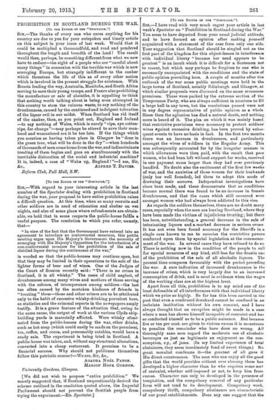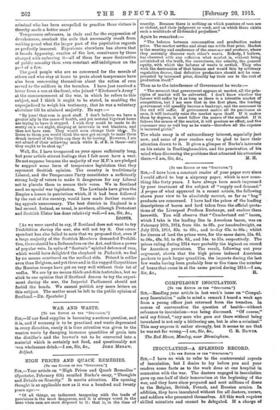1 . 1 . 0 F. Eamon Or Sas "srxmaxos."1 Sra,—I have read with
very much regret your article in last week's Spectator on " Prohibition in Scotland during the War." You seem to have departed from your usual judicial attitude, and to have formed an opinion after making yourself acquainted with a statement of the case from only one aide. Your suggestion that Scotland should be singled out as the first part of the kingdom for this object-lesson in interference with individual liberty " because her need appears to be greatest" is an insult which it is difficult for a Scotsman not to resent, but which may perhaps be forgiven to one who is necessarily unacquainted with the conditions and the state of publio opinion prevailing here. A couple of months after the outbreak of the war some public meetings were held in the large towns of Scotland, notably Edinburgh and Glasgow, at which similar proposals were discussed on the same erroneous premisses. These were packed by the extreme section of the Temperance Party, who are always sufficient in numbers to fill a large hall in any town, but the resolutions passed were not in any degree representative of public opinion as a whole Since then the agitation has died a natural death, and nothing more is heard of it. The plea on which it was mainly based, that restrictive provisions were necessary to protect soldiers' wives against excessive drinking, has been proved by subse- quent events to have no basis in fact. In the first two month■ there was an increase in drunkenneaa, and particularly amongst the wives of soldiers in the Regular Army. This was subsequently accounted for by the irregular manner in which allowances were then paid, with the result that poor women, who had been left without support for weeks, received in one payment sums larger than they had ever previously handled. No doubt also the excitement of the first few weeks of war, and the anxieties of these women for their husbands (only too well founded), led them to adopt this mode of drowning their sorrows. Independent investigations have since been made, and these demonstrate that as conditions became normal there was found to be no increase in female drunkenness, and that the cases which still occurred were amongst women who had always been addicted to this vice.
As regards the soldiers themselves, there are no doubt many cases, especially when the men are leaving Scotland, where they have been made the victims of injudicious treating ; but there has been, notwithstanding, a general decrease in the sale of intoxicating liquors and a marked decrease in serious crime. It has not even been found necessary for the Sheriffs in a single case known to me to exercise the restrictive powers conferred upon them by special legislation at the commence. meat of the war. In several cases they have refused to do so. There is nothing now in the condition of the people to call
for special measures of any kind, still leas for the drastic one of the prohibition of the sale of all alcoholic liquors. The present time compares favourably with the period preceding the war. A. sure indication of increased drunkenness is the increase of crime, which is very largely due to an increased consumption of drink, and is most in evidence when the wages of the working class are at the highest level.
Apart from all this, prohibition is to my mind one of the least defensible of all interferences with that individual liberty which we prize so highly. So far Las this been carried in the past that even a confirmed drunkard cannot he confined in an inebriate institution without his own consent, and I have always thought that an exception might be made in a case where a man has shown himself incapable of restraint and has so conducted himself as to be a public nuisance. But because five or ten per cent, are given to vicious excess it is monstrous to penalize the remainder who have done no wrong. All thoroughly sane men regard the moderate use of alcoholic beverages as just as legitimate an enjoyment as the con- sumption, e.g., of jams. (In my limited experience of total abstainers, they seem inordinately fond of sweet things.) No great moralist condemns it—the greatest of all gave it His direct countenance. The man who can enjoy all the good gifts that the world provides without ever abusing them has developed a higher character than he who requires some sort of restraint, whether self-imposed or not, to keep him from excess. Character can only be developed. in the presence of temptation, and the compulsory removal of any particular form will not tend to its development. Compulsory work, compulsory thrift, compulsory abstinence are characteristic of our penal establishments. Does any one suggest that the criminal who has been compelled to practise these virtues is thereby made a better man ? Temperance reformers, in their zeal for the suppression of drunkenness, overlook the evils that necessarily result from making penal what the larger part of the population regards as perfectly innocent. Experience elsewhere has shown that it breeds hypocrisy, evasion of the law, connivance by those charged with enforcing it—all of them far more destructive of public morality than even constant self-indalgence on the part of a few.
Tire good people who are so concerned for the morals of others and who stay at home to prate about temperance have also been concerning themselves about the ration of runs served to the soldiers in the trenches. I have just received a letter from a eon at the front, who joined "Kitchener's Army" at the commencement of the war, in which Ise refers to this subject, and I think it ought to be stated, in enabling the unprejudiced to weigh his testimony, that he was a voluntary abstainer till he attained majority. He says
"By jove! that mm is good staff. I don't believe we have a greater ally in the cause of health, and yet teetotal bigots at home are trying to have it stopped. I wish they could be made to do sentry on a wet night, sleeping at intervals in wet blankets, and then not have rum. They would soon change their ideas. To listen to them you would think the men got enough to make them drunk instead of the little cup they do be having. However, I am not afraid of their achieving much while K. of K. is there—only they ought to be shut up."
Well, Sir, I have trespassed on your apace sufficiently long, but your article stirred feelings that I felt must hare a vent. Do not suppose because the majority of our M.P.'s are pledged to support some form of temperance legislation that they represent Scottish opinion. The country is traditionally Liberal, and the Temperance Party constitutes a sufficiently strong body of voters to make it dangerous for any Liberal not to placate them to secure their votes. We in Scotland need no special war legislation. The Lowlands have given the Empire a lesson in patriotism which, if it had been followed by the rest of the country, would have made further recruit- ing appeals unnecessary. The best district in England is a bad second. Ireland, as usual, is nowhere, although Protestant and Scottish Ulster has done relatively well.—I am, Sir, dtc., SCOWL
[As we were careful to say, if Scotland does not want to try Prohibition during the war, she will not try it. Our corre- spondent bas also failed to note that we proposed that, even if a large majority of the Scottish Members demanded Prohibi. tion, there should be a Referendum on the Act, and thus a power of popular veto. In spite of "Scotus's" spirited defence of rum, which would have delighted the shepherd in Pickwick, we feel by no means convinced on the medical side. Poland is colder even than Belgium, and yet there and in the rugged Carpathians the Russian troops have got on very well without their tot of vodka. We are by no means thick-and-thin teetotalers, but we stick to our opinion that if Scotland desires to try the experi- ment during the war, the Imperial Parliament should not forbid the bonds. We cannot publish any more letters on this subject. The matter must be left to the public opinion of Scotland.—En. Spectator.]







































 Previous page
Previous page